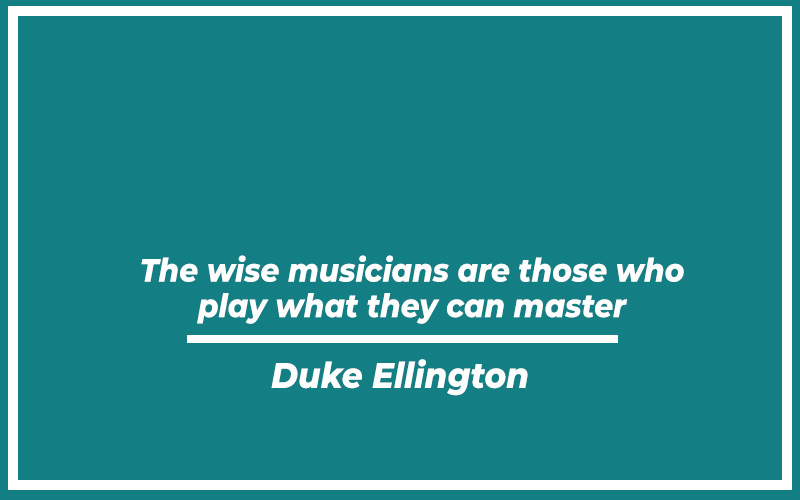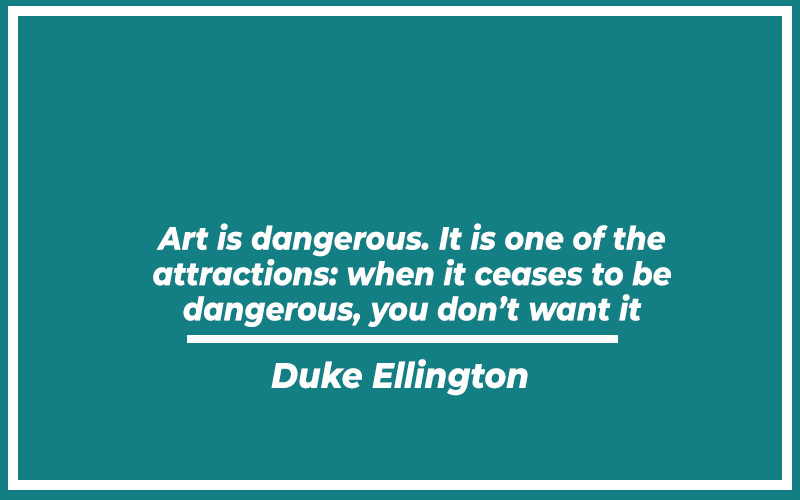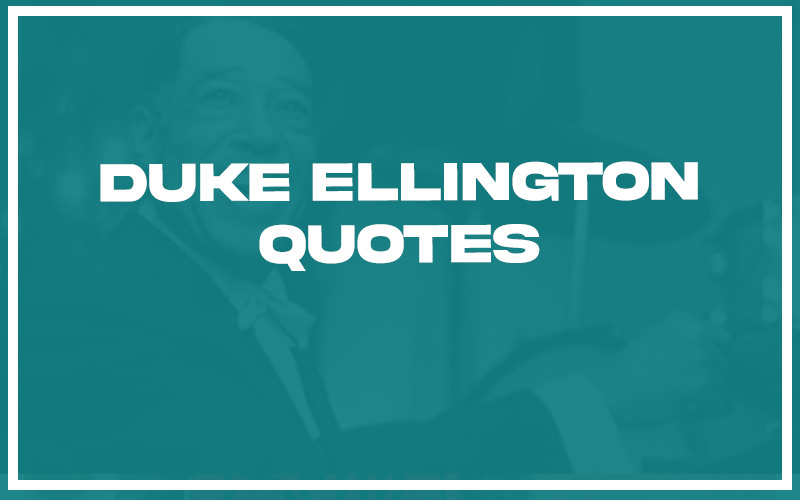When you immerse yourself in the wisdom of Duke Ellington, you’re not just exploring the thoughts of a jazz legend; you’re tapping into the philosophy of a musical innovator.
His quotes resonate with the rhythm and soul of his music, reflecting his deep insights into creativity, life, and the art of music.
Duke had a knack for expressing complex ideas in a poetic yet straightforward manner, and his words often inspire you to see beauty in the everyday and recognize the music in life’s wide array of experiences.
Best Duke Ellington Quotes

“A problem is a chance for you to do your best.” – Duke Ellington
Duke Ellington reframes the concept of problems as opportunities to excel and show one’s best efforts. By viewing challenges in this light, one can turn potential negative situations into moments of triumph. This approach not only encourages a positive outlook on life’s inevitable difficulties but also promotes personal growth by pushing individuals to give their best under pressure.
Ellington’s perspective serves as a motivational reminder that obstacles can be catalysts for demonstrating capability and achieving greater success, fostering resilience and a proactive attitude towards life’s hurdles.
Also Read: Melanie Martinez Quotes (with Explanation)
“It don’t mean a thing if it ain’t got that swing.” – Duke Ellington
This famous quote from Duke Ellington distills a core principle of jazz music: the importance of rhythm and feel, or “swing.” It suggests that no matter how technically proficient music may be, it lacks life and soul without the right rhythmic groove.
This statement emphasizes that music’s impact on the listener derives not just from its melody or harmony but from its ability to move people physically and emotionally. It’s a celebration of the intangible, infectious essence that makes music resonate deeply and remain memorable.
“Art is dangerous. It is one of the attractions: when it ceases to be dangerous, you don’t want it.” – Duke Ellington
Ellington captures the inherent risk and provocative nature of art in this quote, suggesting that its ability to challenge, provoke thought, and stir controversy is what makes it valuable. When art loses this edge, it becomes tame and less desirable.
This perspective champions the idea that true art should push boundaries and confront the status quo, serving as a catalyst for change and deep reflection. It is a call to artists and audiences alike to embrace and value art that dares to make us uncomfortable and question our perceptions.
“Music is the tonal reflection of beauty.” – Duke Ellington
Duke Ellington eloquently expresses the idea that music mirrors beauty through its structure, melody, and harmony. This quote implies that music, much like a reflection, varies in its interpretation based on the listener’s perspective and context, yet consistently remains a representation of what humans consider beautiful.
It highlights music’s role in expressing and evoking beauty, serving both as a creative outlet and a medium through which beauty can be understood and appreciated universally.
“Gray skies are just clouds passing over.” – Duke Ellington
Ellington uses a simple yet profound metaphor to convey optimism and resilience. He suggests that just as gray skies are temporary, so are life’s challenges. This outlook encourages enduring tough times with the assurance that they will improve, much like the weather.
It’s a reminder to maintain hope and a positive attitude, understanding that hardships are not permanent but merely obstacles that will eventually give way to brighter days.
“The wise musicians are those who play what they can master.” – Duke Ellington
In this quote, Duke Ellington advises musicians to focus on honing their craft in areas where they excel, rather than overextending themselves into territories beyond their mastery.
This guidance emphasizes the importance of self-awareness and dedication to continual improvement within one’s capabilities. It suggests that true artistry comes from deep understanding and expert execution, advocating for a concentrated effort to refine one’s skills to their fullest potential.
“If it sounds good and feels good, then it IS good!” – Duke Ellington
Ellington dismisses overly critical or technical assessments of music with a simple criterion: if music resonates emotionally and sonically with an audience, it is effective.
This quote champions the subjective experience of music over theoretical purity, asserting that the true measure of music’s quality is its impact on the listener. It encourages musicians and critics alike to prioritize emotional connection and the visceral response of the audience in their evaluation of musical works
Music is my mistress, and she plays second fiddle to no one.” – Duke Ellington
Duke Ellington personifies music as a dominant force in his life, suggesting it holds a priority unmatched by anything else. This quote reflects his profound commitment to music, implying it demands and receives his utmost attention and loyalty.
It’s a declaration of the deep bond and respect he has for his craft, portraying music not just as a profession but as a commanding presence in his life. The statement celebrates the intense relationship that can exist between an artist and their art, where the art itself becomes a central, defining element of the artist’s identity.
“The wise musicians are those who play what they can master.” – Duke Ellington
Duke Ellington advises musicians to focus on honing their strengths rather than overreaching beyond their capabilities. This quote promotes mastery and suggests that wisdom in music comes from deep understanding and expertise in particular areas.
It encourages musicians to cultivate their skills where they excel, ensuring that their musical expression is both proficient and impactful. This focus on mastery helps build a foundation of confidence and competence, which can be more fulfilling and influential than a broader but shallower skill set.
“Love is supreme and unconditional; like is nice but limited.” – Duke Ellington
Ellington contrasts the profundity of love with the superficiality of liking someone. He elevates love as an all-encompassing, powerful force that transcends conditions and limitations, unlike mere liking, which is pleasant but restricted.
This quote reflects on the depth and resilience of true love, suggesting it endures beyond ordinary affections and preferences, offering a richer, more fulfilling connection. It champions love as the ultimate form of relationship, one that provides significant depth and meaning to life.
“Gray skies are just clouds passing over.” – Duke Ellington
With this metaphor, Duke Ellington offers an optimistic view on adversity, suggesting that difficult times are temporary. He likens life’s challenges to gray skies that will eventually clear up, promoting a message of hope and resilience.
This perspective encourages patience and perseverance, reinforcing the idea that current struggles will lead to better days. It’s a reminder to maintain a positive outlook and to see beyond the immediate troubles, understanding that they do not define one’s entire life.
“A man is a god in ruins.” – Duke Ellington
Ellington reflects on the grand yet often unrealized potential within each individual. This quote suggests that while everyone has inherent greatness akin to a deity, it is frequently compromised by human flaws and life’s adversities.
It’s a contemplative observation on the nature of human potential, recognizing both the innate capability for greatness and the typical shortfall in achieving it. This perspective invites introspection and humility, recognizing the complexity of human nature and the challenges of fulfilling one’s potential.
“Critics have their purposes, and they’re supposed to do what they do, but sometimes they get a little carried away with what they think someone should have done, rather than concerning themselves with what they did.” – Duke Ellington
Ellington acknowledges the role of critics but cautions against their tendency to impose their own expectations on artistic works. He suggests that critics should focus more on assessing what an artist has actually achieved rather than what they believe should have been achieved.
This quote advocates for a fairer, more objective approach to criticism, one that respects the artist’s intentions and accomplishments without imposing subjective standards.
“There are two kinds of worries – those you can do something about and those you can’t. Don’t spend any time on the latter.” – Duke Ellington
Ellington provides practical advice for managing concerns, urging focus only on problems within one’s control. By disregarding worries that cannot be influenced, one can conserve emotional energy and remain more productive and positive.
This advice encourages effective stress management and promotes a proactive attitude towards life’s challenges. It’s a call to action to engage actively with solvable issues while maintaining peace of mind about those beyond one’s influence, fostering a more balanced and contented life.
“By and large, jazz has always been like the kind of a man you wouldn’t want your daughter to associate with.” – Duke Ellington
This quote from Duke Ellington captures his view of jazz as a rebellious and unconventional art form. It humorously conveys the idea that jazz, with its spontaneous and improvisational nature, carries a certain disreputable allure akin to a forbidden relationship.
This perspective celebrates jazz’s edge and its deviation from more accepted norms, portraying it as something daring and irresistibly captivating, yet potentially scandalous.
“Playing ‘bop’ is like playing Scrabble with all the vowels missing.” – Duke Ellington
Duke Ellington’s analogy between playing bebop jazz (‘bop’) and playing a game of Scrabble without vowels highlights the complexity and challenge of this music style.
This quote reflects his view on the intricacy and skill required to perform bebop, characterized by its fast tempo and abstract melodies, which can feel as challenging and incomplete as trying to form words without essential letters. Ellington’s statement underlines the creativity and mastery bebop musicians must possess to thrive in this genre.
“It’s like an act of murder; you play with intent to commit something.” – Duke Ellington
Here, Duke Ellington describes the intense, passionate nature of playing music with a powerful metaphor, suggesting that performing is an act committed with profound intention and impact, akin to a crime.
This quote underscores the seriousness and depth with which he approached music, treating each performance as a significant act that could have a lasting effect on its audience. It highlights the transformative power of music and the deliberate artistry involved in its creation.
“Art is dangerous. It is one of the attractions: when it ceases to be dangerous, you don’t want it.” – Duke Ellington
Ellington sees art as inherently risky and provocative, its danger being part of its appeal. This quote suggests that the value of art lies in its ability to challenge and provoke, and that without these elements, it loses its allure.
It is a call for artists to embrace risk in their work, suggesting that the most compelling art is that which dares to disturb and defy conventions.

“The wise musicians are those who play what they can master.” – Duke Ellington
Duke Ellington advises musicians to focus on and perform the music that they have thoroughly learned and mastered. This quote promotes the virtue of expertise and the importance of musicians understanding their capabilities.
It suggests that true artistry is achieved through deep knowledge and control over one’s craft, rather than superficially tackling a broader range.
“I merely took the energy it takes to pout and wrote some blues.” – Duke Ellington
This quote from Duke Ellington provides insight into his creative process, showing how he transformed negative emotions into artistic expression through blues music.
It highlights the therapeutic power of music, suggesting that art can be a constructive outlet for handling personal struggles and emotional pain.
“There are two kinds of music. Good music, and the other kind.” – Duke Ellington
Duke Ellington simplifies the entire spectrum of music into two categories: good music and everything else. This quote reflects his belief that music’s value is determined by its quality and the emotional and aesthetic response it elicits from the listener, rather than genre, style, or origin.
It’s an inclusive and broad-minded view that promotes the appreciation of music based purely on its merit.
“Fate is being kind to me. Fate doesn’t want me to be too famous too young.” – Duke Ellington
Duke Ellington reflects on the timing of his success with a sense of gratitude and philosophical acceptance. He personifies fate as a benevolent force carefully moderating his rise to fame, suggesting that immediate success might not always be beneficial.
This quote highlights the importance of appreciating the journey and growth that come with time, rather than rushing to achieve fame. It shows Ellington’s wisdom in understanding the broader implications of success and the value of experiencing life’s stages fully before reaching the peak of one’s career.
“Now I can say loudly and openly what I have been saying to myself on my knees.” – Duke Ellington
This statement from Duke Ellington signifies a moment of personal and public affirmation, where private thoughts and prayers become bold public declarations. It reflects a transition from internal contemplation to external expression, highlighting the confidence and readiness to share his innermost beliefs and feelings with the world.
This quote is about finding one’s voice and the courage to speak one’s truth, illustrating the empowerment that comes with artistic and personal maturity.
“Playing ‘bop’ is like playing Scrabble with all the vowels missing.” – Duke Ellington
Duke Ellington describes the complexity of playing bebop, a style of jazz that requires improvisation and creativity, akin to attempting a word game without essential components.
This analogy highlights the challenge and skill required to excel in bebop, emphasizing the musician’s ability to innovate and communicate effectively even under constrained conditions. It showcases Ellington’s respect for the genre’s demands and his understanding of the depth of artistic expression needed to perform it successfully.
“If anybody was Mr. Jazz, it was Louis Armstrong. He was the epitome of jazz and always will be. He is what I call an American standard, an American original.” – Duke Ellington
Duke Ellington pays homage to Louis Armstrong, elevating him as the quintessential figure in jazz music. This quote acknowledges Armstrong’s profound impact on jazz and his enduring legacy as a pivotal figure in its history.
Ellington’s praise positions Armstrong not just as a musician but as an American icon, whose contributions transcended music and shaped cultural perceptions of jazz as a deeply American art form.
“We are all a little broken. But last time I checked, broken crayons still color the same.” – Duke Ellington
Ellington uses a simple yet profound metaphor to express resilience and functionality despite flaws. He suggests that like crayons, which can color beautifully even when broken, people too can function and contribute positively despite their imperfections.
This quote is an affirmation of inherent worth and capability, encouraging an acceptance of flaws while focusing on the ability to still create and inspire.
“The most important thing I look for in a musician is whether he knows how to listen.” – Duke Ellington
For Ellington, a musician’s ability to listen is paramount—more critical than technical skill alone. This perspective emphasizes the importance of listening in music as a foundational skill that enables collaboration, improvisation, and emotional expression.
It speaks to the heart of jazz, which relies heavily on the interplay and harmony between musicians, and underscores the necessity of being attuned to one’s surroundings and fellow performers.

“Art is dangerous. It is one of the attractions: when it ceases to be dangerous, you don’t want it.” – Duke Ellington
Ellington celebrates the provocative and transformative power of art, asserting that its capacity to challenge and disturb is what renders it valuable. He implies that art should provoke thought, stir emotions, and push boundaries; without these elements, it loses its appeal and effectiveness.
This quote encourages artists to embrace and explore the edgier, riskier aspects of creative expression, which are essential for art to remain relevant and impactful.
Also Read: You Only Live Once Quotes (with Explanation)
Final Thoughts
Duke Ellington’s quotes are like his music: timeless, profound, and deeply moving. They encourage you to find your rhythm, to improvise when necessary, and to always contribute your unique voice to the symphony of life.
Let Duke’s words remind you that no matter the situation, there’s a chance to create something memorable and beautiful.
Embrace his lessons not just in your musical endeavors but in every aspect of your life, and carry forward the elegance and grace that he brought to every note he played.

